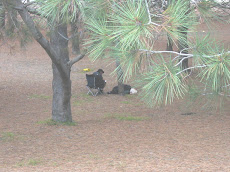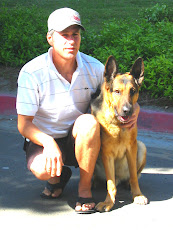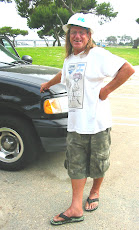It is the stuff of Greek tragedies and great movies. It is the stuff we hope never happens to us in real life, for the end is very, very bad; and there is nothing to help it but to tear your eyes out at the sockets, wander aimlessly through the barren landscape of a life destroyed, and wish for death to come early. Revealing any part of a difficult truth seems to betray God and every hope of humankind. Friends scatter at the horror. There is nothing to say. Nothing left to do. The curtain falls, and we desperately want to laugh.
What lessons were intended in this time of my life and their meaning are still obscure to me, even if one can read simple answers in the outline. And that is the tragedy of it: it were as though Greek gods were moving people and situations around on a lark and making it all up as they went along. Only a god who does not share our humanity could think of such chaos and want to see it performed, lived out, as it were.
In the simplest terms, I met a man. He happened to have suffered in his life from alcoholism, but he also had a successful working wife who took care of him, that is to say, she paid for his court-ordered trips to rehab for DUIs. No one talks about this, but drinking and driving is great fun. In fact, I have tried it; and I can see how someone who likes alcohol better than I do might drink and drive with frequency. Perhaps more people do than we think.
What lessons were intended in this time of my life and their meaning are still obscure to me, even if one can read simple answers in the outline. And that is the tragedy of it: it were as though Greek gods were moving people and situations around on a lark and making it all up as they went along. Only a god who does not share our humanity could think of such chaos and want to see it performed, lived out, as it were.
In the simplest terms, I met a man. He happened to have suffered in his life from alcoholism, but he also had a successful working wife who took care of him, that is to say, she paid for his court-ordered trips to rehab for DUIs. No one talks about this, but drinking and driving is great fun. In fact, I have tried it; and I can see how someone who likes alcohol better than I do might drink and drive with frequency. Perhaps more people do than we think.
Having had an excess of time to think about the circumstances under which I and this man met and all the attractions there were, I have come to think that life is ultimately fair, which does not mean that life will be painless. I no longer believe things add up, creating an abundance of good or bad karma, for instance. One may see the world in that way, with blinders on. One may see the world through any construct one wishes, and it will appear to be such.
What is fair about life is that we are all here more or less on the same footing. None of us is good, and few of us are categorically evil. No one knows what is coming in the next minute, hour, or day. None of us knows how we will act under every circumstance we come across, and we are certainly no one else's judge. There are many, many variables at all times and those variables are exponentially multiplied in interactions with other people.
Sometimes, we think we have a hold on reality and are setting our own course. We have, after all, a history: we have parents, went to school, have a job, and so on. We may have the illusion for a while that we even know ourselves. Yet, there are startling, uncomfortable discoveries that come with age: we have no idea, really, how we turn out the way we do. The sinuous threads of our lineage, culture, and personal history become harder to follow, like the crumbs in the forest that were to lead us out of darkness into the dawn, but now make a path more like a puzzle that sometimes has T-crossings, circles back on itself, or offers side trails that beckon but yield neither a way out nor any truth worth the time it took to travel them.
Simply stated, I no longer want to blame anyone for my perceived misfortune and misguided conduct because, while it is easy to do, it is dangerous. Even though someone else may be blameworthy (and we are all responsible because we are all here together), resentment is a millstone, an incredible poison. It is the golem of Jewish folklore that, created by its owner to defend and avenge, can become enormous and uncontrollable and come back one day to overpower and crush its maker.
Getting past the emotional hurdles of a difficult circumstance is daunting. It is traumatic, and sometimes scarring, to wrangle with resentment, grief, anger, and shame all at the same time. That is really the bigger story and, oddly, the only way out. The circumstances that led to the emotional hurt are long gone, so, in the end, one has to find the strategies to overcome oneself.
Forthright, once and for all, I will say here so that it is perfectly clear: I am finished with the story of the man who betrayed me. It is true that he lied, and that he is an inveterate liar has been substantiated a few times over by other women he has known whom I later came to know. The entire story has been replayed ad nauseum in many variations from several points of view. Finally, one must ask, "So what?"
Perhaps it is my existentialist tendencies, but it is also my ethics that have dictated this stance. Oddly, sometimes the truth is just not that important, especially given that truth can be static, freezing us in time, locking us in memory as someone we once were, but no longer are. Truth is the enemy of change unless truth changes and becomes a different truth. No truth should last too long.
Along with the devilment of truth, there is the insistence upon meaning. How interesting it is to come out of that Platonic trance that insists everything have meaning, that is, a logical relatedness we often refer to as progress or harmony. It is refreshing and strange to discover the parallel universe of "shit happens," "it doesn't mean anything," "it didn't matter," and "it is what it is." In fact, it is downright heartening since most people in the world actually live in that universe, not in the cozy, prepackaged trajectory of happy-endings with which certain classes in the western world are programmed (as I was). That universe is true, too, of course, until it isn't; and when it is no longer true, the fall is long and hard to reach an equilibrium, a relative security, and a new sense of perspective.
If one hangs on to truths, forgiveness of the unconditional kind is impossible. In fact, the point of all those lovely truths evaporates. For example, my former lover made mistakes, but he did not make his decisions in the first place because they were mistakes at the time. I have come to appreciate how much love, hope, and goodness went into a dream that did not work out as planned and how much courage it takes to dare to create anything, relationships with the opposite sex being particularly complex and often capricious. What beauty there is in a personal landscape that was shaped by dreams, whether or not they manifested quite as we imagined them.
Once we are beyond judging outcomes based on like or dislike and want or don't want, we are free to respect ourselves and others for choosing to live and love past the incompleteness, failure, and loss to which one must surrender. For the miracle is loving oneself not just when things turn out well and make us feel good, but when there are unforeseen outcomes which we consider mistakes. There is no celebration of uncertainty in our culture, the kind of uncertainty that is the proving ground for strength of character, and far too little respect for those among us who dare. Perhaps that would be a culture with a taste for tragedy, like that of the Greeks, which did not pretend there were perfect outcomes or that perfect outcomes do not change, like the static notions of Christian heaven.
Finally and most importantly, there is loyalty to one's life --- every part of it --- no matter how much of it your mother thinks was a mistake or, lacking your mother's example, what you have picked out and scourged as somehow unworthy of who you are. We are informed, created, by our experiences; it is best to fall in love with them.
Despite my good fortune in the past year (very good fortune, indeed, at a time when so many people do not have work or other financial means), I have managed to find fault with it rather than accept and appreciate the radical transformation this very good fortune has allowed. I am healing quickly from the vestiges of Post-Traumatic Stress Disorder. I am so far along in my healing that I notice a moment of anxiety now rather than only noting its occasional absence. I am aligning myself with the forces of positive change in this world and seeking out others like me who want to create more of it. I am learning, too, how to live in peace with ambiguity, uncertainty, and constant change.



















